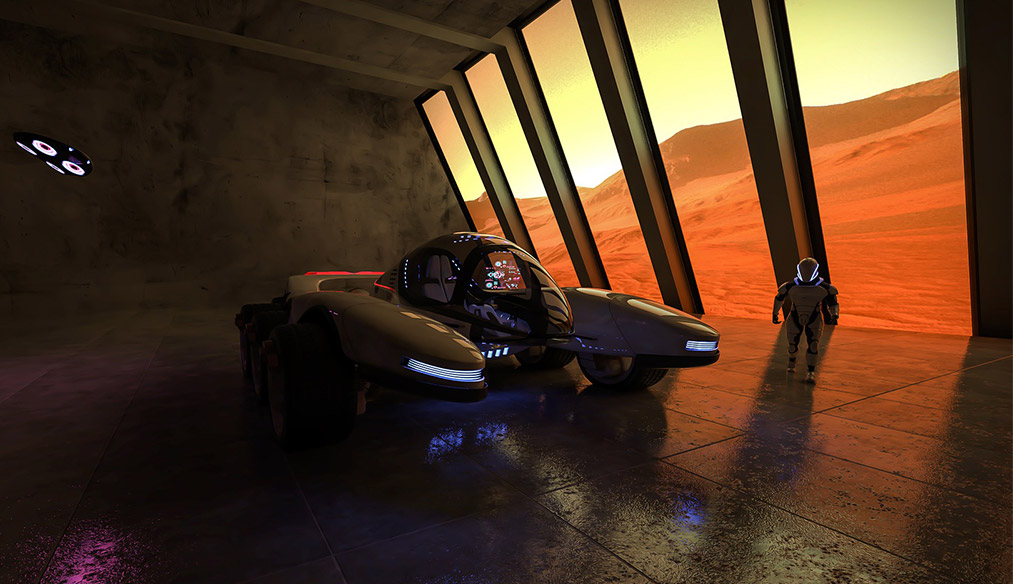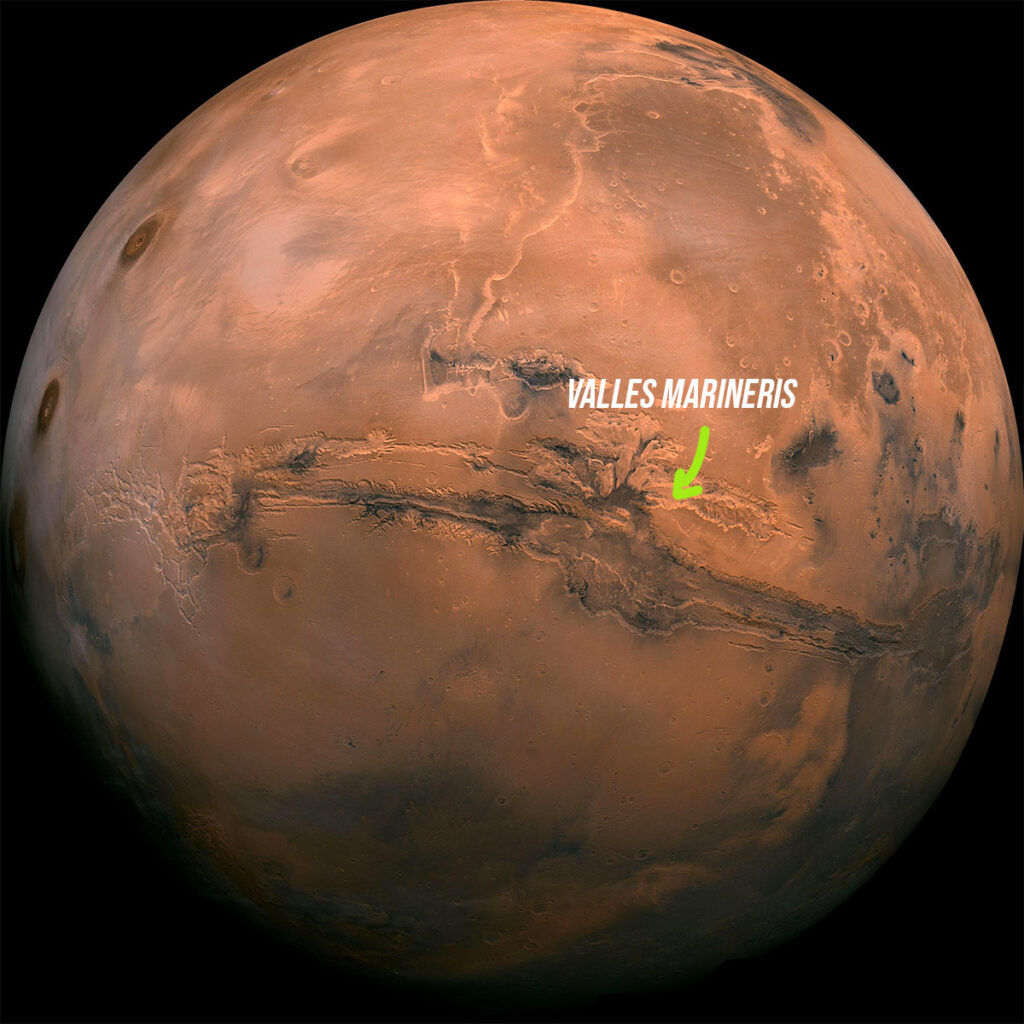Why do some famous people like Elon Musk insist so much that humanity must go to Mars? Why should we pour billions of dollars into such a long-term, dangerous, and risky journey when we have many challenges yet to solve down here on Earth?.
All those are valid questions, and in this article, I’m going to try to do my best to convince you that there are enough reasons for humankind to invest in creating a colony on Mars where we can live.
Let’s get to it.
10) To look for life on Mars
Finding life on another planet would be the greatest scientific discovery of our lifetimes. It would help us better understand the conditions that are necessary for the development of life and maybe solve the yet unresolved mystery of how life started on Earth.
While the unmanned rovers that we have sent to Mars have made progress on the search for life on the red planet, like the Curiosity river finding traces of methane (a byproduct of living organisms), there is still no concrete evidence that there is or there ever were life forms on Mars.
It is very likely we will not find the kind of definitive evidence we want until we go and look for it ourselves.
9) To develop new forms of transportation
In order to make it efficient for humans to travel back and forth between Earth and Mars, we will need to develop new forms of transportation. One of the main challenges is making rockets that can be used for multiple trips instead of being disposable. These rockets will greatly reduce the cost of launching a spaceship and will make it more viable for us to travel between planets.
We will also need to develop vehicles that work on Mars. The fuel engines most Earth cars and vehicles use won’t work on Mars due to its atmosphere.
Mars’ gravity will also be a challenge. Mars has about 1/3 the gravity of Earth, so any vehicles that are used on Mars will have to be designed so they don’t end up floating aimlessly every time they run into a bump on the road.
Can you imagine what other new kinds of transportation we will invent on Mars? How would a Martian train or airplane work? Hey, with Mars’ gravity maybe we will all finally be able to use personal jetpacks to move around as they’d need less propulsion.
8) To test new forms of government
Great thinkers and people who study those subjects have new ideas on new systems to organize society and different types of government.
Unfortunately, it would be too hard to test these here on Earth as it would mean starting from scratch in many senses and adopting new habits and a different view on how society is structured and the obligations that each one of us would have.
Mars could be a blank slate for this and our opportunity to test something new.
It will be necessary for a colony on Mars to work under its own set of rules and independent from Earth’s flags and interests. Otherwise, its development would become too slow and could cause it to fail long-term.
Elon Musk has already talked about how SpaceX won’t recognize Earth laws on its Mars mission and any colony that we could eventually develop should follow suit if it wants to succeed.
7) To learn to terraform planets
Unfortunately, humans can’t breathe on Mars. If we want humanity to expand throughout the universe and eventually become a galactic civilization, we must learn to terraform planets.
Terraforming means modifying the climate and atmospheric conditions of a planet to make them closer to Earth. This will result in planets where humans would be able to live and breathe without help from sealed spacesuits and where we could grow food suitable for us.
Finding planets that are habitable for humans is too hard. Our bodies have evolved exclusively to live on this planet and any minor change in temperature or atmospheric conditions makes it impossible for us to live without help from spacesuits. Even though we have found planets that might be suitable candidates to have the necessary conditions for us to live in, we still haven’t been able to confirm even one of them as a truly habitable planet.
That is why it will probably be easier to modify the planets to adapt them to our needs. Mars has the right conditions to be our first experiment in this regard.
6) To see Earth from Mars
Did you know that you can see Earth and the Moon in the Martian night sky?
Just like we can sometimes see Mars at night without a telescope, it would also be possible to observe our home from the red planet with the naked eye.
Both Earth and the Moon look like two bright stars on Mars. You would be able to see them for 6-12 hours at night because the day/night cycle of Mars is very similar to Earth’s. A day on Mars is about 24 hours and 37 minutes.
The Curiosity Rover has already sent us photos of Earth and the Moon in the Martian sky.
5) To investigate why Mars became inhabitable
Scientists believe Mars might have been habitable at some point in its history and might have contained liquid water and even life.
At some point in its history, Mars suffered changes that turned it into the red, inhabitable desert that it is today. What happened to it?
There are many theories. It might have been caused by a giant meteorite colliding with the planet. Other scientists believe it slowly lost part of its atmosphere because its weak magnetic fields couldn’t protect it from Solar winds. And a less likely, but really fun theory is that at some point it was hit by a gigantic cosmic thunderbolt that left the huge geologic scar right in the middle of it (also known as Valles Marineris) that you can see in the image above.
We probably won’t know which of these theories is the real one until we go over there and investigate for ourselves.
Understanding how other planets became inhabitable will help us learn how to protect our own.
4) To make technology that improves our day to day life
One of the criticisms for space exploration is that a lot of money is invested that could be used for other pressing challenges that we have now instead of later.
Not only is this wrong (NASA’s budget is less than half a percentage point of the U.S. spending plan), but it doesn’t take into account all the side benefits that developing new technology creates.
When new things are invented for space, sometimes it turns out the technologies also have fantastic use cases for other industries. This tech trickles down and improves our day-to-day lives.
Some major examples are things that were invented for the Apollo missions to the Moon and that are now used everywhere. Maybe the best examples of this are modern Solar panels and integrated circuits, which weren’t invented by NASA, but they were perfected to be used on the missions. Some other inventions include freeze-dried foods, breathing masks that are now used by firefighters around the globe, water purification technology, improvements in battery life, spring tires, the motors that are now used by every portable vacuum cleaner on the planet, and many others.
NASA has a minisite where they keep track of all these.
3) To develop brand new industries
Lots of brand new industries will be created when we become a multi-planet civilization.
First, there is the obvious case of gathering and mining resources that are abundant in other places, but scarce on Earth. For example, on Mars, there’s plenty of Deuterium found naturally. Deuterium is a gas that is an isotope of hydrogen. It can be used as a powerful energy source. On Earth, Deuterium can be found occasionally in the ocean, but only in small quantities, or it is expensive to extract because it’s bonded to protium.
Besides natural resources and space mining, other industries will flourish. There will be a whole industry based around Mars tourism. Maybe Mars will start to export the food they produce to Earth. Space souvenirs will be way more common. Maybe Martian technology will surpass Earth’s in some ways.
Getting to Mars may represent the beginning of a new economic boom for both planets.
2) To enjoy the view in space
Who hasn’t dreamed about going to space? It’s the ultimate trip for anyone who has looked at the stars and wondered what’s out there.
Just the view from the window would be worth the trip for some of us.
A trip from Earth to Mars takes about 7 months with our current technology so you would have plenty of time to enjoy the view.
1) To increase humanity’s odds of survival
I don’t want to alarm you, but sooner or later, Earth is doomed. It might take millions of years, but there are many threats out there that could potentially end all life on the planet. From asteroids to the inevitable expansion of the Sun, something is bound to happen.
If we are going to survive as a species, we must learn to colonize other planets and become a space-faring civilization. It’s not optional.
But why start now if we might have millions of years?
We don’t know when a worldwide catastrophe could happen, we also don’t know how long it will take us to develop the necessary technology for it, and more importantly, we don’t know how many resources it’s going to take, so we need to start early rather than later to ensure we don’t run out of some resource we might need.
Thankfully, there are many people already working on getting us started, and we will do this by first learning how to live on Mars.
Summary
- Colonizing other planets is not optiona for humankind if we want to thrive as a species
- Mars has the right conditions to be our first target to create a space colony
- A colony on Mars would also have many side-benefits










